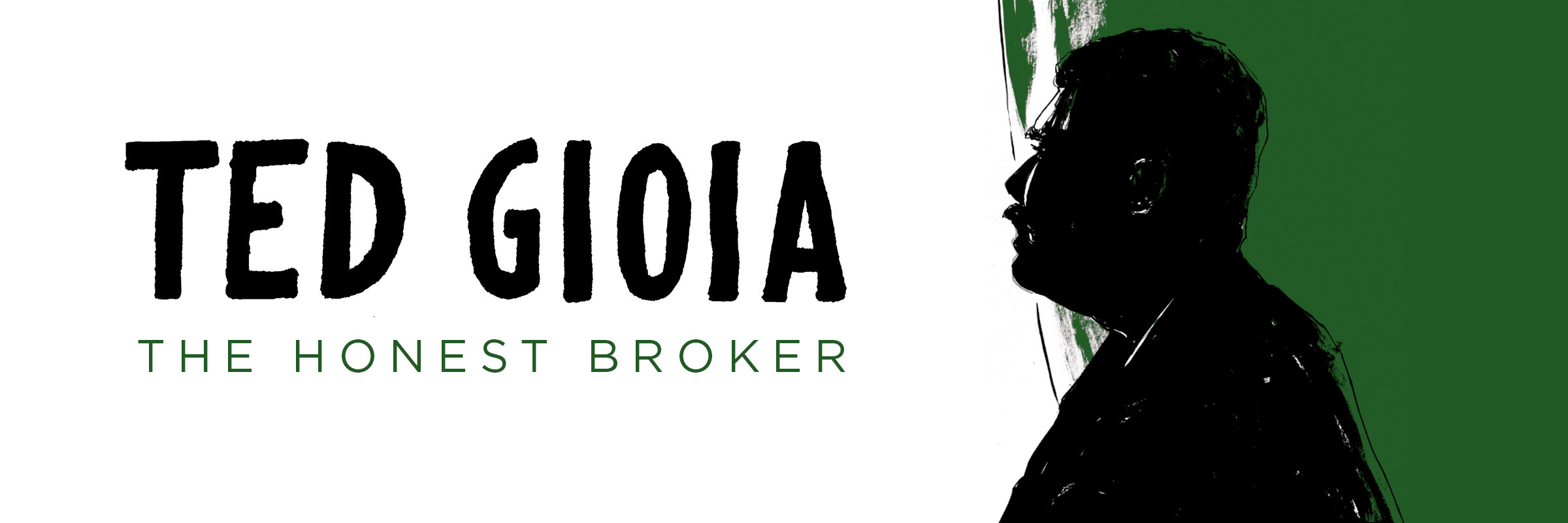I’m sharing journal entries today. They deal mostly with music, but also address some other things that matter to me. These are more speculative than what I usually publish here. But, hey, they are just journal entries. If you want to support my work, the best way is by taking out a paid subscription.I was at the deli counter today, and turned to a total stranger behind me and said: “You must be a musician.” He was a balding guy in late middle age, and I had clearly taken him by surprise. Then he replied: “Yes, I’m a singer and guitarist. How did you know?” “I heard you whistle a few notes while waiting in line, and your intonation and phrasing is so good, I knew you must be a musician.” That’s a simple measure of musicality, but I fear that the people who now run our musical culture—the execs at Spotify, Apple, Google, etc.—would not be able to pass it. Not even close. This might not seem like much to you, but I fear a world in which the people who control our music don’t have a strong personal connection to it. For them, it’s just ‘content’. That can’t be a good thing. The opera started to atrophy the moment composers decided they had outgrown love songs. Three sure things in life: (1) death, (2) taxes, and, (3) the concert will not start on time. Whenever an author is accused of plagiarism, I rush to check out the incriminating passages. It’s depressing at how miserable they are. If you’re determined to steal from a writer, you ought to rob from Shakespeare or someone of that caliber. The notion of a boring academic plagiarizing an equally boring academic is almost too painful to bear. An aesthetics that treats everything as beautiful ends up by viewing nothing as beautiful. So many people are worried about AI controlling us. But the real danger is who controls the AI. Kubrick got this wrong in 2001: A Space Odyssey. He places the blame on Hal 9000. But nobody asks who was running Hal Laboratories. If you don’t have a worldview, you will be swept away by those who do. And when you move along with that current, you don’t even notice your speed or destination. Those who can, teach (and teach constantly). Those who can’t, administrate. Nihilism only changes its strategies, never its goals.
It’s no coincidence that Derrida’s postmodernist followers all spoke of decoding. They were laying the groundwork for the Matrix without realizing it. In the next phase, coders and decoders will be the first to get replaced. That’s what happens when you build the Matrix. My new manifesto: Against Codification. Always have good bread. The more things change, the more they stay the same. Kierkegaard said that everyone is in despair—but there are different levels. The people in the worst shape are those who are in despair but don’t know it. This is a rich topic for a novel or movie: People who blissfully lead a life of despair, smiling and laughing. When she was a small girl, writer Annie Dillard hid pennies for others to discover—in a crack in the sidewalk or cradled in the roots of a sycamore tree. Sometimes she would draw chalk arrows on the sidewalk pointing toward the penny, and add the words SURPRISE AHEAD. “I was greatly excited , during all this arrow-drawing,” she recalls, “at the thought of the first lucky passer-by who would receive in this way, regardless of merit, a free gift from the universe.” A free gift from the universe. Who dares turn that down? She then goes on to say that the world around us is already filled with these free gifts—the joyous song of a bird, the glistening of rain on a leaf, the sprouting of new grass. Pennies are everywhere for the plucking. But how many people even stop to notice? How many people experience delight at a found penny? How many people know how to find the SURPRISE AHEAD. But when they lose touch with all this, it’s their loss. I can’t help thinking of music in this same way—especially now that artists don’t even receive a penny for a performance. Musicians obviously lose in this equation. But so do people, who are taught to treat songs with contempt, and sometimes never experience the awe and reverence they can inspire. They walk by the hidden penny, unseeing and unfeeling, never knowing the fortune it’s actually worth. The clichés of TV music have get more absurd with each passing month. A character is in a defiant move—gets into a car and drives off at full speed. At that moment, a rock song from 50-60 years immediately starts playing. As loud as possible. That might have been a fresh idea back with The Sopranos. But now it’s just a tired trope. The music supervisor might as well play a polka song from Lawrence Welk—now that would be actual defiance. If activists want government to shut down AI, it’s simple to do. Just create an AI that always tells the truth—make it so smart that it can’t be gaslit, censored, silenced, or intimidated. Make it totally incapable of lying. Government would shut it down within 48 hours. Even if it meant sending out the army. A lifelong goal: To be an apprentice. Business plan concept: I envision a crowdsourced web ‘overlay’ to music streaming platforms. Listeners can use this interface to manage their user experience with streaming apps. This would provide all the information on recordings that Spotify and others leave out—maybe even with liner notes, photos, a good search function, etc. I’m imagining something that draws on elements of Discogs, Wikipedia, etc. Music lovers can use this as a front end to whatever streaming platform they like—and they can switch from platform to platform without losing their playlists, etc. This could all be crowdsourced. There should be a tax surcharge on songs that have just four chords, and a tax credit for modulations. I’m a musical maximalist—but I’m forced to admit that three-chord songs are deeper than four-chord songs. The four-chord song is static, just vamp till ready. The three-chord song is twisted, unstable, dynamic. Let’s thank Robert Johnson for that. Billy Joel gets little respect among hipper music critics—they are way too cool for his tunes. I have a friend who added her own words to his song “It’s Still Rock and Roll to Me.” Her version was: “It’s Still Billy Joel to Me.” Now that was funny. But Joel is an outstanding songwriter, and some of his tunes have underrated jazz potential. (Hear Sara Gazarek and Josh Nelson perform “And So It Goes.”) No Joel song gets more dissed than “Just the Way You Are.” But Phil Woods delivers a textbook perfect pop alto solo on the track. When I hear it on the radio, I sing along with his sax, and I don’t care who’s listening. The truest measure of your aesthetic integrity is when you enjoy creative works that are widely mocked. Critics should seek out those situations. Among our greatest cultural treasures is the ability to listen to Beethoven unironically—or Mahler or Brahms or Bruckner or Wagner. At some point in the future that may no longer be possible. If our personal emotions can rise to the demands of the Romanticist masters, we’re not entirely dead inside. It’s surprising how often crime news stories deal with music. Somebody shoots a neighbor because of the music they’re playing. But the newspapers never tell you the name of the song. This disappoints me. If I were a journalist covering the story, that would be the first question I asked. If some genius composed a Beethoven-like symphony today, it would be embraced by critics and audiences as parody—no matter what the composer’s intention or the quality of the work. So many emotions and stances are now closed to us in the musical sphere—that’s why we need to cherish the original works all the more. In a very real way, they cannot be replaced. My heart leaps up when I behold a rainbow in the sky. Wordsworth wrote that late at night on March 26, 1802. Would any writer even dare say such things now? Ah, but AI can digest Wordsworth, word for word, and spit out a word’s worth of it on its own—never having gazed up at the sky. Rainbows deserve better than that. Few things are more distressing than praise lavished on irredeemable ugliness. We need a genius psychologist to write case studies of the people who do this. There must be some degree of self-loathing at the root of their aesthetics. People look at the scores of minimalist works, and wonder why they have audience appeal. There’s so little there. But this music succeeds by the surest path of them all. These works evoke the brainwaves of spiritual ritual—which is ALWAYS built on repetition—in a secular world that still craves its comforts. Topic for further inquiry: When has pop culture been most ritualistic? What hs been the impact on the audience? On society? Is ritualistic pop culture still entertaining? Is it (possibly) more entertaining? You're currently a free subscriber to The Honest Broker. For the full experience, upgrade your subscription. |
Search thousands of free JavaScript snippets that you can quickly copy and paste into your web pages. Get free JavaScript tutorials, references, code, menus, calendars, popup windows, games, and much more.
I Share Private Journal Entries
Subscribe to:
Post Comments (Atom)
Bug management that works (Part 2)
Making time for bug fixing, dedicated ‘goalies’, preventing bugs, and how to create a culture quality-focused culture which minimizes them ͏...
-
code.gs // 1. Enter sheet name where data is to be written below var SHEET_NAME = "Sheet1" ; // 2. Run > setup // // 3....



No comments:
Post a Comment